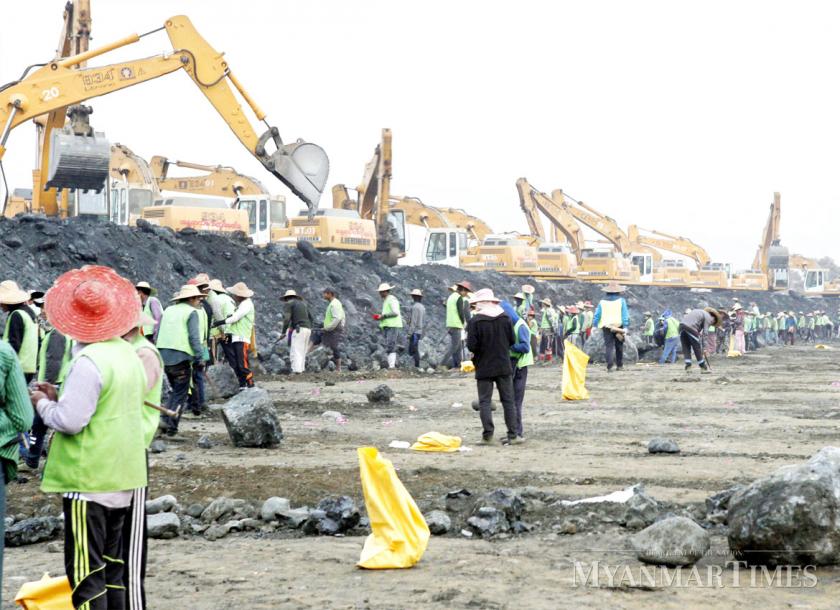Myanmar’s parliament passed a controversial bill governing the gemstone sector by paving the way to restart licensing of mining companies after two year moratorium
13 Feb 2019
Myanmar’s parliament has passed a controversial bill governing the gemstone sector, paving the way to restart the licensing of mining companies after a two-year moratorium.
Upon taking office in 2016, the National League for Democracy-led administration suspended issuing new or extension of existing gemstone licences pending a governance review intended to clean up the sector.
The new law is aimed at eradicating illegal mining and extraction of gems, tackle illicit gemstone trade, and reduce the environmental impact of extraction activities.
The legal text seen by Myanmar Times only covers medium, small and artisanal-scale mining and limits the duration of permits to three, two and one year respectively.
Lawmakers in the Pyidaungsu Hluttaw said large-scale mining is excluded from the legislation because of its negative environmental consequences.
Yet, the law does not specify how to tackle companies which bypass the size restrictions, for example, by applying small or medium-scale licences next to each other.
It also does not address the conflict of interest in state-owned Myanmar Gems Enterprise (MGE), which is critical to the sector’s reform.
To preserve the integrity of regulatory functions, institutions responsible for awarding extractive rights and monitoring performance should remain separate from those commercially or financially dependent on operations, a May 2017 report from Natural Resource Governance Institute stated.
Under the new legal framework, MGE still acts as both the industry’s major regulator and a commercial partner in mining projects, posing an unresolved problem.
Despite the new law’s objectives, the legislation has been received poorly by governance experts and civil rights groups. In addition, the possible re-licensing of mining companies based on the bill’s passage presented a key risk.
“The government plans to use the new gemstone law as the justification to restart the issuing of licences to jade and gemstone companies. This is worrying for Myanmar because the law does not adequately address the root causes that led to the 2016 licensing moratorium,” NRGI’s country manager U Maw Htun Aung said.
International anti-corruption NGO Global Witness said the legislation does not take into account the government’s gemstone policy or environmental management plan (EMP).
For Paul Donowitz, who heads Global Witness’ work in Myanmar, it is “disappointing” for Myanmar to legislate a new gemstone law “in a closed process, without adequately addressing serious corruption, governance and conflict dimensions around the jade sector.”
The government should have waited for the Ministry of Natural Resources and Environmental Conservation’s gemstone policy to be finalised, before updating the law and then restarting the licensing, he said. Efforts to harmonise the policy and law through the regulatory process will fail on key issues not covered in the legislation.
“The new law is problematic for many reasons in that it makes no reference to beneficial ownership disclosure requirements, mandated under the Extractive Industries Transparency Initiative, and fails to outline clear licensing criteria that would prevent companies with a track record of human rights abuses, harmful environmental impacts and other illegal practices from obtaining new jade mining permits.
“The law appears to allow the same military-linked, crony, and shadowy conflict actors to resume mining in earnest, but whether they are able to continue their massive, heavily mechanised operations is not as clear based on the law’s restrictions on mining sca;e,” he told The Myanmar Times.
U Maw Htun Aung highlighted the issues concerning licensing and revenue collection. The legislation fails to clarify how the government awards licences to companies, especially what criteria it uses to make decisions. It contains insufficient safeguards to ensure that companies with a history of poor environmental, social or governance performance are not awarded licences. Also, revenue collection practices “have not been meaningfully reformed”. This means the government will likely continue to collect less money than it is due from this multi-billion dollar industry. “Particularly, the valuation process – where stones are valued to determine how much royalty the company needs to pay – continues to be susceptible to mismanagement, undervaluation and corruption.”
But he stressed that the upcoming gemstone policy provides “some cause for optimism”. The policy has been drafted by the government – in collaboration with civil society organisations and the private sector – over the last two years, setting out the country’s vision for the sustainable mining.
“The policy can help to patch up some of the remaining weaknesses in the legal framework and should form the basis for further reforms,” U Maw Htun Aung emphasised.
Political dialogue to addresses ethnic demands for sharing the benefits of natural resources and implementing the recommendations from the 2017 EMPs for the Hpakan area are the most important reforms for the gemstone industry, according to Vicky Bowman from the Myanmar Centre for Responsible Business.
These will help to address the serious safety and environmental issues. However, enforcement is also a must, and this is difficult to achieve in the “lawless environment in Hpakan”.
MONREC could not be reached for comments by press time.
(The Myanmar Times: https://www.mmtimes.com/news/parliament-passes-gemstone-bill-amid-criticism.html )











